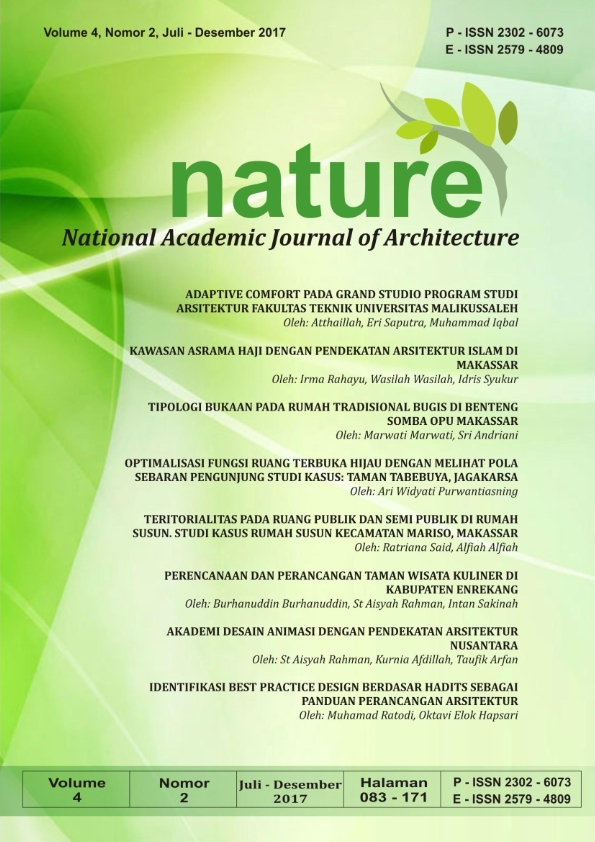STUDI COWORKING SPACE BAGI MILENIAL
Abstract
Abstrak. Perubahan arah sektor ekonomi dari ekonomi industri ke ekonomi kreatif tentunya juga membawa perubahan pada sistem bekerja di dalamnya. Pemanfaatan teknologi yang semakin canggih membuat cara bekerja pada hampir semua jenis pekerjaan menjadi lebih mudah. Kaum milenial pun perlahan mulai meninggalkan gaya bekerja tradisional dan mulai beralih ke gaya bekerja yang fleksibel dan santai. Dengan coworking space, milenial dapat dengan mudah memilih dimana, kapan, dan bagaimana mereka akan bekerja. Selain itu, adanya manfaat dari berbagai sisi seperti ekonomi, sosial, sustainability, dan psikologis, juga menjadi alasan coworking space banyak diminati saat ini. Penelitian ini bertujuan untuk mengetahui kebutuhan apa saja yang diperlukan milenial pada coworking space untuk memberikan kenyamanan. Menggunakan metode deskriptif analitik dengan pendekatan kualitatif, didapatkan hasil bahwa selain fasilitas yang memadai, banyak hal lain yang perlu diperhatikan untuk membangun coworking space. Penelitian ini dilakukan di kota Bandung, sebelum terjadinya pandemi dan belum diterapkannya pola kebiasaan baru. Kedepannya, penelitian ini diharapkan dapat menjadi salah satu referensi dalam mendesain coworking space yang lebih baik dan menerapkan pola kebiasaan baru.
Kata kunci: Coworking Space; Kebutuhan; Milenial.
Abstract. Changes in the direction of the economic sector from the industrial economy to the creative economy also bring changes to the working system in it. The use of increasingly sophisticated technology makes it easier to work on almost all types of work. Millennials are slowly starting to leave the traditional work style and begin to shift to a flexible work style. Coworking space is a place for this style of work. With coworking space, millennials can easily choose where, when and how they will work. In addition, the benefits from various sides such as economic, social, sustainability, and psychological, also the reason coworking space is in great demand today. This study aims to determine what millennials need in coworking space to provide comfort. Using a descriptive analytic method with a qualitative approach, the results show that in addition to adequate facilities, many other things need to be considered to build an ideal coworking space. This research was conducted in Bandung, before the occurrence of pandemic and new normal was not implemented. In the future, this research is expected to be one of the references in designing better coworking spaces and applying new normal rules.
Keywords: Coworking Space; Needs; Millennials.
Downloads
References
Barnhill, Grant, and Jamie Russo. 2017. The Five Essentials to Opening a Coworking Space. WUN.
Capdevila, Ignasi. 2013. "Knowledge Dynamics in Localized Communities: Coworking Spaces as Microclusters." SSRN.
Clifton, Nick, Anita Fuzi, and Gareth Loudon. 2014. "New In-House Organizational Spaces That Support Creativity and Innovation: The Co-Working Space." academica.edu. June. Accessed June 2020. https://www.academia.edu/7430165/New_in-house_organizational_spaces_that_support_creativity_and_innovation_the_co-working_space.
Deijl, C.M. 2011. Two Heads are Better than One: A Case Study of the Coworking Community in the Netherlands. Bachelor Thesis, Rotterdam: Erasmus University Thesis Repository.
Deskmag. 2015. Deskmag : First Results Of The New Global Coworking Survey. November 20. Accessed June 2020. http://www.deskmag.com/en/first-results-of-the-new-global-coworking-survey-2015-16.
Dodd, M. 2010. 100 Best companies 2010. Working Mother.
Fuzi, Anita. 2015. "Co-working Spaces for Promoting Entrepreneurship Insparse Regions: The Case of South Wales." Regional Studies, Regional Science 461-468.
Gandini, Alessandro. 2015. "The rise of coworking spaces: A literature review." Ephemera 193-205.
Hartog, L.M. 2015. User Satisfaction in Multi-Tenant Offices: The Relation Between Personality and Demographic Characteristics of Users and Their Satisfaction with Physical Characteristics of Multi-Tenant Offices. Master Thesis, Netherlands: Eindhoven University of Technology.
Hillman, Alex. 2011. Coworking core-values. October. Accessed July 2020. https://dangerouslyawesome.com/2011/10/coworking-core-values-series-translated/.
Hochberg, Adam. 2010. NPR: For Telecommuters, It's Not About Going To Work. February 9. Accessed July 22, 2020. https://www.npr.org/templates/story/story.php?storyId=123406526.
Kementerian Sekretariat Negara Republik Indonesia. 2018. Ekonomi Kreatif Masa Depan Indonesia. November 23. Accessed June 24, 2020. https://www.setneg.go.id/baca/index/ekonomi_kreatif_masa_depan_indonesia.
Koevering, J.G.C (Jasper) van de. 2017. The Preferred Characteristics of Coworking Spaces - The Relation Between User Characteristics and Preferred Coworking Space. Master Thesis, Netherlands: Eindhoven University of Technology.
Kwiatkowski, Angel, and Beth Buczynski. 2011. Coworking: Building Community as a Space Catalyst. Colorado, USA: Cohere Coworking.
LaSalle, Jones Lang. 2016. A New Era of Coworking. JLL.
Liebregts, M.M.M. 2013. The Modern Work Environment In Different Countries: How Do Employee Preferences Differ With Regard To The Modern Work Environment Between Countries? Master Thesis, Netherlands: Eindhoven University of Technology.
Merkel, Janet. 2015. "Coworking In The City - 'Saving' The City: Collective Low-Budget Organizing and Urban Practice." Ephemera 121-139.
Moriset, Bruno. 2014. "Building New Places of The Creative Economy: The Rise of Coworking Spaces ." Geography of Innovation International Conference. Utrecht: Utrecht University .
Murdowo, Djoko, Andreas Handoyo, Rangga Firmansyah, Refyanti Dwi Pramedesty, and Anisa Fadhillah. 2018. "Analisa Standar Interior pada Co-Working Space di Bandung (Studi Hubungan Karakteristik Pengguna Start-Up Bisnis Kreatif terhadap Kebutuhan Standar Perancangan Interior)." Idealog 50-60.
Parrino, Lucia. 2015. "Coworking: Assessing The Role of Proximity Knowledge Exchange." Knowledge Management Research & Practice 261-271.
Spinuzzi, Clay. 2012. "Working Alone Together: Coworking as Emergent Collaborative Activity." Journal of Business and Technical Communication 399-441.
Susante, P.J.M. van. 2015. Differences in Employee Satisfaction in New Versus Traditional Work Environments. Master Thesis, Netherlands: Eindhoven University of Technology.
Swaney, Chad. 2018. Communication, Information, and Knowledge In A Coworking Space. Dissertation, Malibu, California: Pepperdine University.
Sykes, Krista. 2014. Coworking: A Workplace Paradigm Shift. August 22. Accessed June 2020. https://www.contractdesign.com/practice/design/coworking-a-workplace-paradigm-shift/.
Copyright (c) 2021 Annisa Nisrina, Andreas Handoyo

This work is licensed under a Creative Commons Attribution-ShareAlike 4.0 International License.
By submitting your manuscript to our journal, you are following Copyright and License











